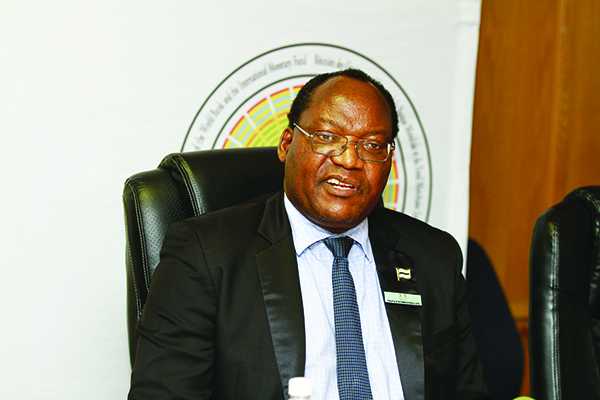IMF calls for public sector reforms
Economic policies sound for economic stability
Privatisation should be accelerated
Botswana should seriously consider reforming its public sector in addition to keeping a close eye on investment made on its education sector to avoid skills mismatch, International Monetary Fund (IMF) advised on Tuesday.
This suggestion is, but part of a number of recommendations which the Bretton-Woods institution wants the landlocked country to undertake if it is to attain sustained economic recovery and prosperity going forward.
Botswana, a semi-arid country poised for an expanded budget deficit this current financial year, should urgently proceed with measures to improve the planning, prioritisation and execution of investment programmes which fall under the private sector.
Recently, finance ministry Secretary for Economic and Financial Policy, Dr Taufila Nyamadzabo told the media that IMF has raised concerns over the amount of funds invested in public projects and the return thereof.
Moreover, the 50 year-old country should also build capacity in the management of public-private partnerships, improve the financial monitoring and evaluation of state-owned enterprises as well as accelerating the privatisation of key loss-making enterprises. In the past, some of the top officials manning government parastatals have been forced to step down due to allegations of corruption and incompetency, which in the end affected some public corporations adversely.
Since privatisation was mooted more than 15 years ago, Botswana Telecommunications Corporation Limited (BTCL) remains the only entity to have partly fallen in private hands through a stock listing last year. Other candidates for privatisation are Air Botswana and National Development Bank (NDB).
Recently, Air Botswana’s privatisation bid hit a snag after the chosen strategic partner, Wilderness Safari pulled out at the last minute. Initial efforts to privatise the national airline in the early 2000s were also unsuccessful. The Washington-based IMF has also called on government to speed up the establishment of the energy regulator, Botswana Energy Regulator (BERA), review the structure of electricity subsidies and reduce political interference on them. Government recently appointed Rose Seretse as founding CEO of the energy regulator, a development which has set tongues wagging. She is currently head of government’s graft-busting agency, Directorate on Corruption and Economic Crime (DCEC).
IMF economists, who were in Botswana some weeks ago, have also suggested that government enhance education outcomes and reduce skills mismatch. “The authorities need to accelerate the implementation of the strategic plan aimed at enhancing the quality of instruction and training across education levels,” said IMF which Botswana is a member of.
Speaking at a consultative meeting with professional bodies recently, Human Resource Development Council’s (HRDC) Human Resource Development Planning (HRDP) Director, Dr. Ellah Matshediso said they are planning to redirect the needs of the industry to educational institutions so that graduates’ qualifications are aligned to what the workplace needs.
HRDC is responsible for planning and funding of the education and training as well as advising government on all matters related to human capital development. IMF has also told Botswana to deepen dialogue between the private and public sector to improve the quality of education in the country.
Granting of work-permits to foreign workers should be made easy. “These actions will ultimately foster private sector development and facilitate the transfer of skills to the domestic labour force,” said IMF. Botswana has over the years been criticised for being rigid on issuance of work permits to foreigners, a development which hampers competitiveness. To boost the country’s ease of doing business, government should also accelerate plans to establish one stop shop to reduce the burden of moving from one office to another.
Botswana has tried over the years to diversify the economy but with little success. The IMF has provided some advice in its latest report on the mining-rich economy. “Efforts to diversify the economy can usefully focus on removing distortions and improving competitiveness,” said the crisis-lending Fund headed by Christene Lagarde. Capacity constraints, high transport costs, and the risks associated with industrial policies argue for an approach based on removing distortions and investing wisely in key public infrastructure.
“If industrial policies are pursued, the authorities should undertake careful cost-benefit analysis and ensure minimal government intervention. Furthermore, fiscal incentives and tax concessions (including in economic zones) should also be carefully evaluated and, if granted, be in the form of accelerated depreciation schemes or investment tax credits,” pointed-out IMF. On a more positive note, the Fund has commended the Ian Khama-led economy for its appropriate macro-economic policies.
The economy is undergoing a cyclical recovery and the outlook is broadly positive. Supported by a gradual rebound in the global diamond market and public investment, annual real economic growth is projected to approach 5 percent in the near term while prudent financial policies are expected to maintain inflation within the 3–6 percent objective range set by the Bank of Botswana (BoB). In the medium-term, the outlook is also positive and risks are balanced, said the IMF. BoB has kept interest rate at 5, 5 percent, although commercial banks have complained it (rate) has reduced their profitability. The central bank will release its decision on bank rate in less than two weeks from now.






